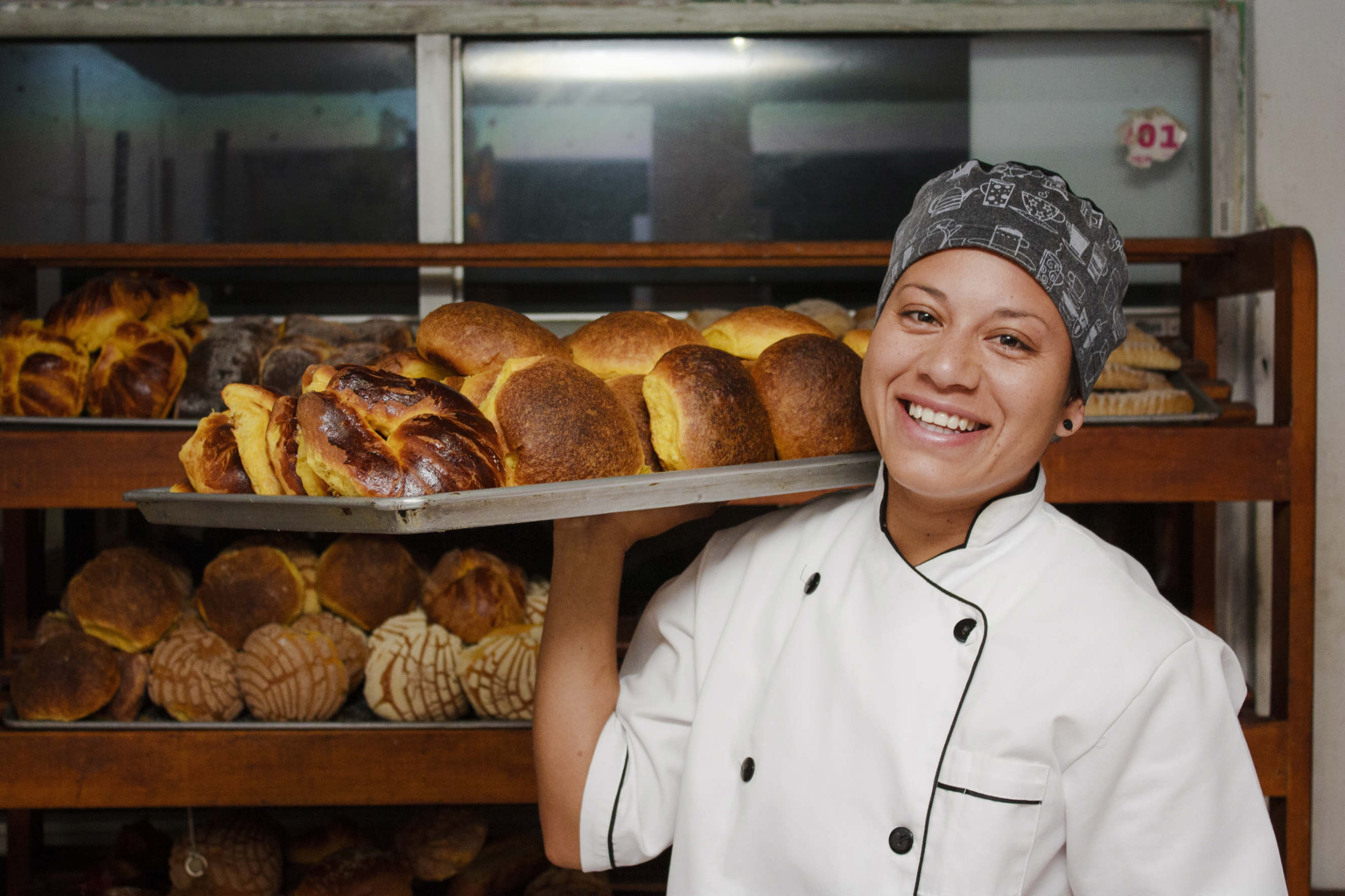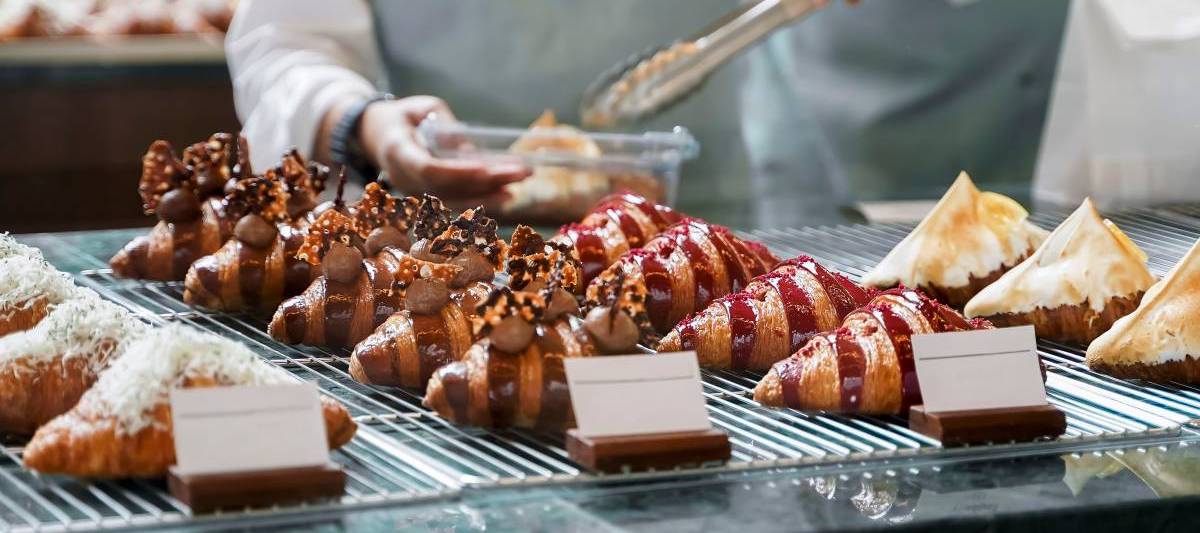
How to start a bakery and make money from it
Earn extra money by baking sweets and goodies!
Find your next customerLast Updated on
Have you been told that your baked goods were so good that you should consider baking cakes for a living? Or perhaps you love baking so much that you want to know how to start an online bakery but don't know where to begin?
If you're ready to make baking a side hustle, we've prepared a guide for you to know how you can make money baking. Read on!
How profitable is baking?
Baking is a flexible and straightforward way to earn extra money because people will pay for high-quality baked goods. According to PayScale, bakers earn an average of £9.23/hour.
While you can make a living as a home baker, you may need to complete an apprenticeship or a college course if you wish to pursue this profession. If you get a college course, you can get, for example:
Level 2 Certificate in Hospitality and Catering
Level 2 Certificate in Bakery
Level 3 Diploma in Professional Bakery
How much you make will depend on how good you are, the difficulty of the product you make, how long you've been baking, and how many items you bake per month.
What you need to start your baking business
1. Make a business plan
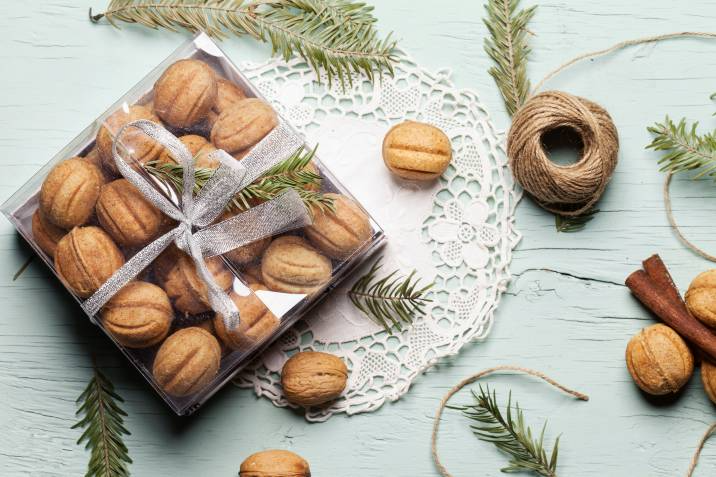
Work out the basics of your business to help you keep track of your budget. Find out what your monthly sales need to be, and factor in costs such as baking materials, ingredients, transportation, and delivery.
As a start-up, keep costs low and don't spend more than you need. Consider using your kitchen as your workplace before you move somewhere bigger. Also, dedicate a separate bank account for your business so you won't mix your personal and business budgets.
2. Gather equipment
Start sourcing your materials and ingredients. If you already bake regularly, you may already have the following equipment:
A working oven
A mixer
Mixing bowls and pans
Spatulas and other utensils
For ingredients, you can always go to supermarkets like Tesco or Sainsbury to get basics like butter and flour. You can check out stores such as Andrew Ingredients or BAKO for specialty ingredients. Factor in packaging like boxes, liners, doilies, and cake boards.
3. Pour through recipes and ideas
Talk to friends and family about the baked goods you've made and ask what they liked and how you can improve them.
Check out food magazines, websites, and other media on what foods are popular. This gives you an idea of what customers want to spend their money on. Knowing what works and doesn't will help you understand what to sell as your business grows.
4. Check the Food Standards Code
As you research, check in with the Food Standards' requirements for food businesses. You will need to register as a food business because food law requires registering activities where food is supplied on a regular and organised basis.
So while you may not define yourself as a business, if you sell food, you are a food business under food law.
When you start a food business, you will need to inform the HMRC that you're self-employed to alert them that you will pay taxes through self-assessment.
What to bake
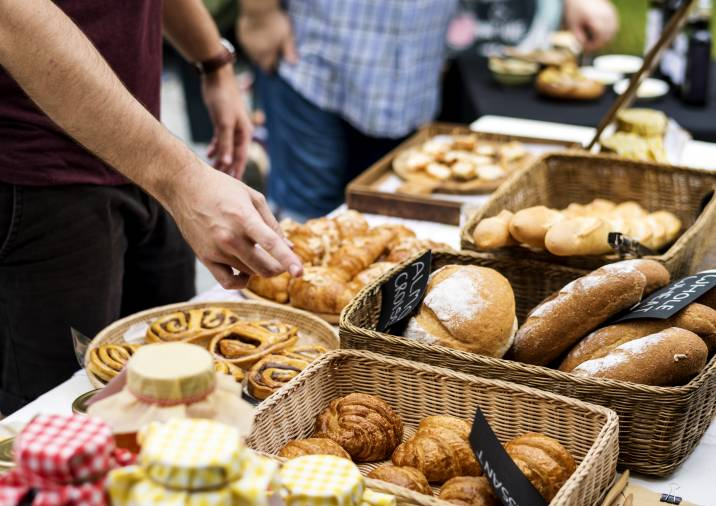
Now that you've done the groundwork, it's time to identify which baked goods will make it into your menu!
What baked goods are the most profitable?
Some baked goods you can make are banana muffins, chocolate chip cookies, brownies, lemon bars, blondies, and more. Victoria Sponge and chocolate fudge cakes also remain popular and are some of the most consumed baked products in the UK.
Recently, vegan bakery products have seen huge demand from consumers. Look into gluten-free, nut-free products to add to your baking goods lineup.
Creating specialty items
One way to make your business stand out is by having a signature item. This could be a custom cake, cheesecake cup, or something people will be drawn to. Experiment and try out new items.
You can even consider changing ingredients to suit those with allergies, like going for gluten-free or nut-free baked goodies.
How to price your baked goods
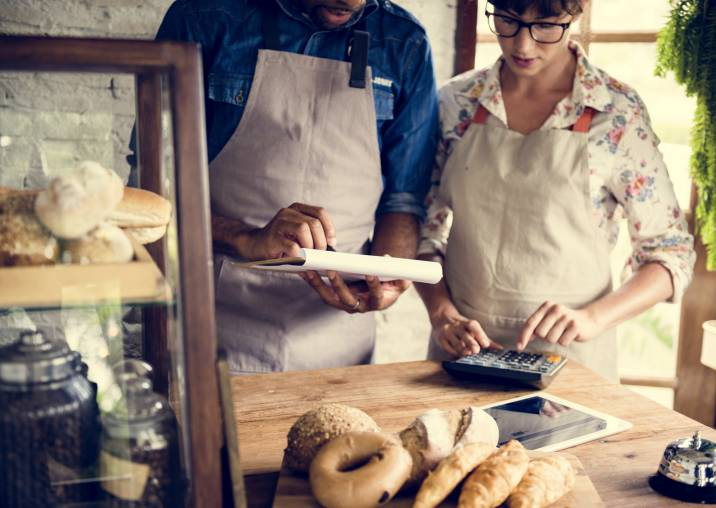
Charging the correct prices is the foundation of having a profitable business. Here are some factors to consider when pricing your baked goods and projecting profit.
Overhead costs
These costs cover ingredients and labour, utility bills, leasing, equipment maintenance, cleaning products, and marketing costs. There will be three types of overhead costs to consider:
Fixed costs - those that don't change month to month, such as rent and utility bills.
Variable costs - costs that increase once the business takes off, such as the number of ingredients, additional labour, and packaging.
Start-up costs - spent during the early days of your baking biz, such as equipment or paying a real estate broker to find you a place.
Product costing
In order to determine how much you cost your products, make sure to get the Cost of Goods Sold (COGS). This is directly tied to your profit margins, revenue, and inventory management. At the minimum, your price should be able to cover your COGS.
|
A good formula to remember is: Cost per serving + Labour cost per item + Overhead costs (variable costs + fixed costs) + Startup costs |
Profit margins help determine how much you can make per sale. Depending on the industry, a 10% profit margin is average, and a 20% profit margin is good. Make sure to strike a balance between getting the profit you need and meeting realistic prices for customers.
How to get customers
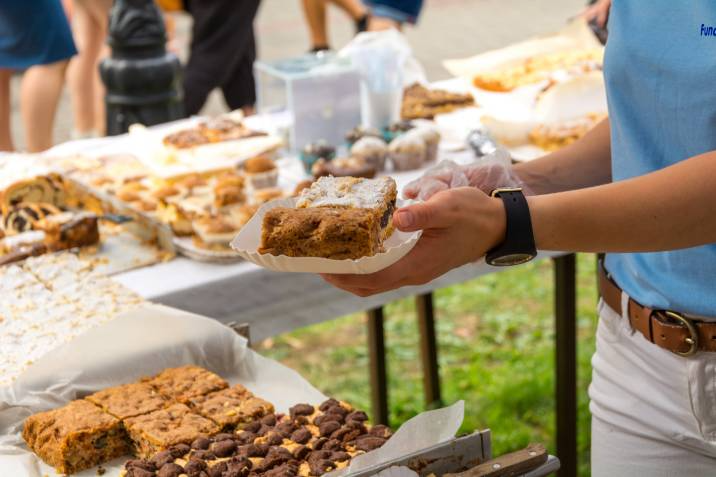
No matter the size of your bakery, there are a few different options where you can win clients for your business. Below are options for where to sell baked goods.
Physical location
The best way to get word on your baked goods is if people get to see and taste them. Start scouting for locations where you can sell your products. Location is crucial to give your product visibility. Some places to look into are:
School fairs
Farmer's markets
Concerts and events
Malls
You can also consider partnering with other small businesses and giving out free tastings for further visibility.
Online selling
If you're baking from home, creating an online store might be the more convenient option when you begin your business. Creating social media pages and setting up shop features on Facebook and Instagram will make for a seamless online shopping experience for your customers.
You could also put up an e-commerce website or an online form where people can place custom orders. If your neighbourhood has an online group, it won't hurt to post your biz and take orders from whoever is interested nearby.
Another way to push your baked goodies is to find clients. You can check out local community boards or find a job posting at Airtasker to get your products out.
Marketing your business
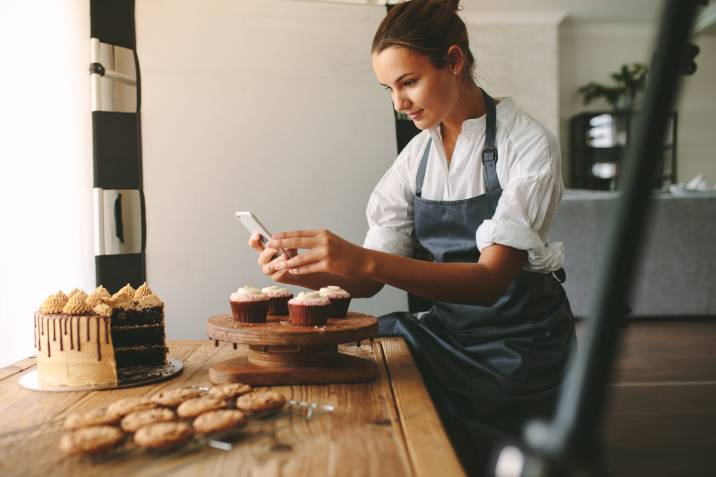 Thinking of how to advertise your home baking business? Here are some marketing strategies you can run with in your early days of setting up your bake shop.
Thinking of how to advertise your home baking business? Here are some marketing strategies you can run with in your early days of setting up your bake shop.
Offline marketing
Get the word out on your baked goods by marketing. Start by telling friends, family, or co-workers about your pastries. Before you start selling, you may need to push your product to people by giving them gifts or as party favours for friends' birthdays or bridal showers.
Online marketing
You can also utilise social media platforms like Facebook, Instagram, and TikTok to showcase your goodies. Make sure to leave your contact details and upload photos and videos of your products to entice people to try them out.
Bring the joy of baked goods to others!
Express your creativity or show off your business prowess through baking!
If you're seeking additional income or looking for a creative outlet, there are many side jobs available for you to try out. Sign up on Airtasker today and get your baked goods sold out!
Frequently asked questions
In order to start your own bakery, you must register as a food business with the Food Standards. When you start a food business, you will need to inform the HMRC that you’re self-employed to alert them that you will pay taxes through self-assessment.
Yes, you can make and sell cakes from home! However, Food Standards state that those who handle food on a regular and organised matter must register as a food business, even if you don’t consider yourself to be one.
Create your profile and start browsing jobs in minutes
Start earning now
Related articles
Related price guides
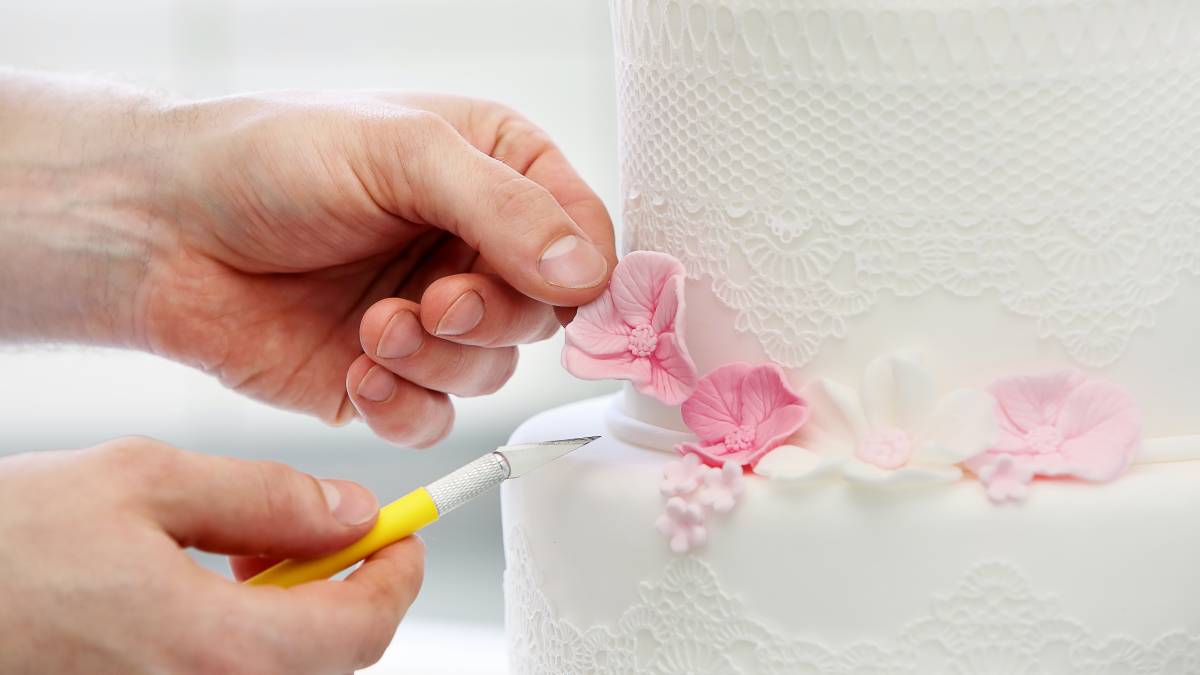
How much does a wedding cake cost?
Read more
